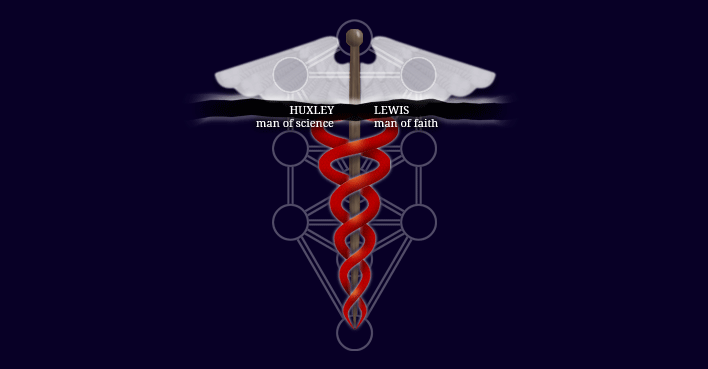(i) Man of Science, Man of Faith

T.H. isn’t the only Huxley to be linked to the Abyss. A trail of esoterically relevant coincidence leads me to the work of his grandson Aldous, which throws up yet more fascinating connections.
Aldous Huxley wrote The Doors of Perception, an essay in essence about crossing the Abyss. The title comes from another very pertinent piece of writing, a section in William Blake’s The Marriage of Heaven and Hell.
If the doors of perception were cleansed every thing would appear to man as it is, infinite. For man has closed himself up, till he sees all things thro’ narrow chinks of his cavern.William Blake, The Marriage of Heaven and Hell
Blake’s words evoke the symbolism of the labyrinth. Walking the labyrinth, traversing the twists and turns of life, the traveller is below the Abyss, where he sees all things through “the narrow chinks in his cavern.”
When the doors of perception are cleansed, the traveller breaks out of the limited view from within the labyrinth and instead gets the overview, perceiving the labyrinth as a whole. He is now above the Abyss, where everything is revealed as it truly is: infinite.
(HUXLEY'S PERCEPTION)
Huxley’s essay reiterates Blake's sentiment.
To be shaken out of the ruts of ordinary perception, to be shown for a few timeless hours the outer and inner world, not as they appear to an animal obsessed with survival or to a human being obsessed with words and notions, but as they are apprehended, directly and unconditionally, by Mind at Large— this is an experience of inestimable value to everyone and especially to the intellectual.
Aldous Huxley, The Doors of Perception
Towards the end of the essay, Huxley compares systemic reasoning to a much more immediate experience of life: direct perception.
Systemic reasoning is something we could not, as a species or as individuals, possibly do without. But neither, if we are to remain sane, can we possibly do without direct perception, the more unsystematic the better, of the inner and outer worlds into which we have been born.
Ibid.
Huxley is talking about stepping beyond the limitations of our rational mind in order to experience something much more immediate.
The structure of thought is finite because language is finite. Words create a labyrinth that can entrap us if we come to believe that the language of the intellect is the only way of assessing the world.
To cross the Abyss is to rise above the labyrinth: to pass beyond words, beyond rational thought, and into direct perception. Here we experience the Mystery of Creation.
The man who comes back through the Door in the Wall will never be quite the same as the man who went out. He will be wiser but less sure, happier but less self-satisfied, humbler in acknowledging his ignorance yet better equipped to understand the relationship of words to things, of systematic reasoning to the unfathomable mystery which it tries, forever vainly, to comprehend.
Ibid.
The Marriage of Heaven and Hell is intimately connected with the symbolism of the Caduceus.

In Blake’s vision, the world is out of balance because the greater part of humankind is disconnected from its deeper nature. Heaven is a realm of Reason divorced from the natural energies of the body, whereas Hell is a realm of the senses where “Energy is Eternal Delight” and any corruption is the result of the authoritarian and repressive nature of Heaven.

HELL
ENERGY
Blake argues that the division between Heaven and Hell is false and makes an impassioned plea for it to be broken down and the two united.
(ETERNAL DELIGHT)
Blake is one of a long tradition of visionaries who believe in a spiritual dimension to the world but who rail against the dualistic view of literalist religion. He proclaims that -
All Bibles or sacred codes have been the causes of the following Errors.
- That Man has two real existing principles Viz: a Body & a Soul.
- That Energy, call'd Evil, is alone from the Body, & that Reason, call'd Good, is alone from the Soul.
- That God will torment Man in Eternity for following his Energies.
But the following Contraries to these are True
- Man has no Body distinct from his Soul for that call'd Body is a portion of Soul discern'd by the five Senses, the chief inlets of Soul in this age
- Energy is the only life and is from the Body and Reason is the bound or outward circumference of Energy.
- Energy is Eternal Delight.
William Blake, The Marriage of Heaven and Hell
Blake is not calling for us to welcome evil into our lives but is challenging the very concept of evil. His reason is encapsulated in the book’s final line.
The Marriage of Heaven and Hell influenced two significant twentieth century authors, both writing books with titles alluding to Blake’s work. Aldous Huxley, who was in favour of Blake’s vision, wrote The Doors of Perception and Heaven and Hell; C.S. Lewis, who disagreed with Blake’s vision, wrote The Great Divorce.
The Doors of Perception is about a shift in perspective from below the Abyss – a world of dichotomy where things are separate – to above the Abyss, where all-is-one.
The title of Lewis’s work, The Great Divorce, suggests the Abyss itself – the separation between Heaven and Hell, the angels and the demons, or the wings and snakes of the Caduceus.
Huxley was a rationalist, from a family of famous scientists. Lewis was a Christian apologist – a man of faith. The two men were approaching the Abyss from different angles.

By a strange twist of fate, both men died on the same day.

 TOP
TOP NEXT
NEXT